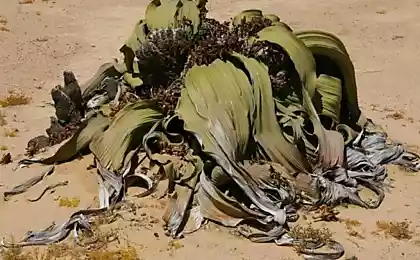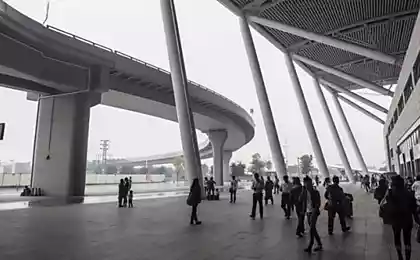539
Report from China: the story of a farmer who thinks in centuries
Dance nation Fox in the village of liming. Beautiful, fun, perky. However, at first we thought that the dancers use for locals but the guide said that the view is held primarily for Chinese tourists. The audience, instead of clapping, knock wooden bricks on the table at which they sit. 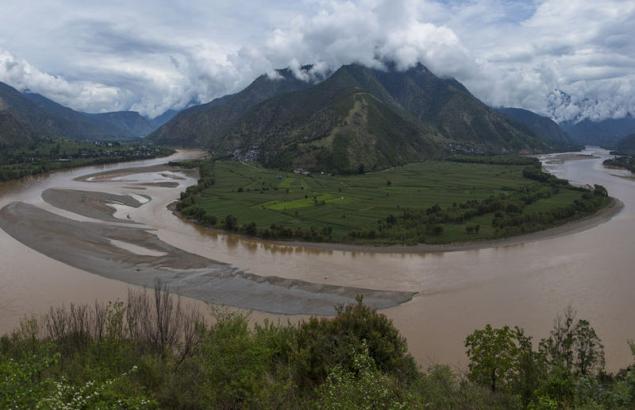
This place in Yunnan province is called the first turn of the Yangtze. To the North is the national Park "Three parallel rivers" in which the three major rivers of Asia — the Yangtze, Mekong and Salween — flow almost parallel from North to South. But here, in the town of Shiga, the Yangtze changes direction almost 180 degrees and begins to flow North while the Mekong and Salween continue to flow to the South and soon leave China. Changjiang — the longest river in Eurasia, — popetlyat in Yunnan, begins to flow to the East and connects the whole China. On the East of the country, near Shanghai, the Yangtze flows into the East China sea.Photo: Andrey Kamenev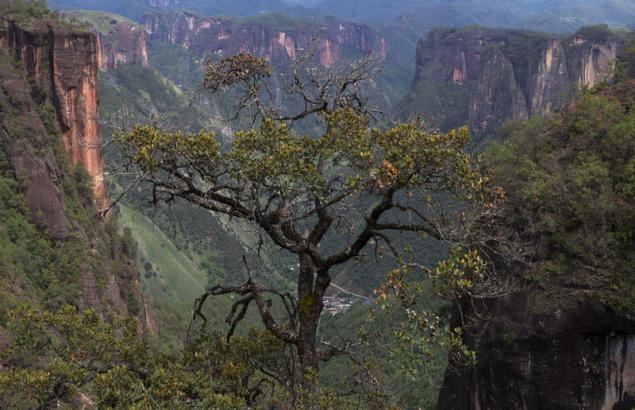
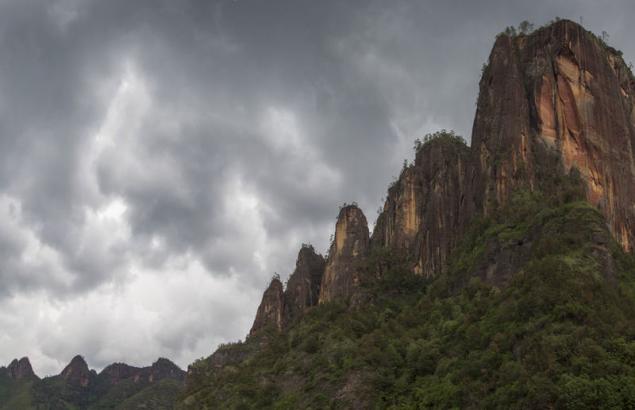
A team of Russian National Geographic in conjunction with the Clarins representatives went to the Chinese province of Yunnan to shoot the project on the conservation of biodiversity. Read the new report and see the pictures.
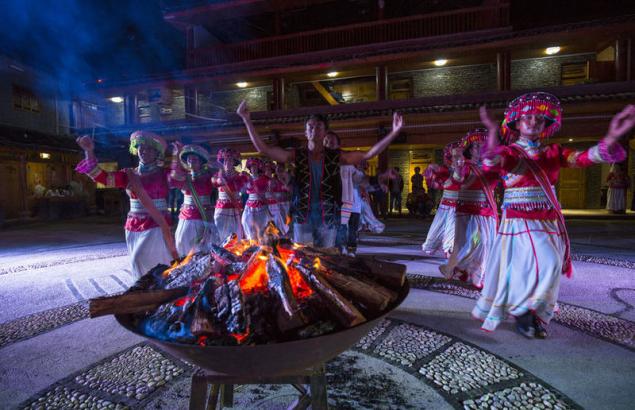
If the Chinese Kunming, about which we talked earlier — "city for life", our next stop on the way — the ancient city of Lijiang — the "place".
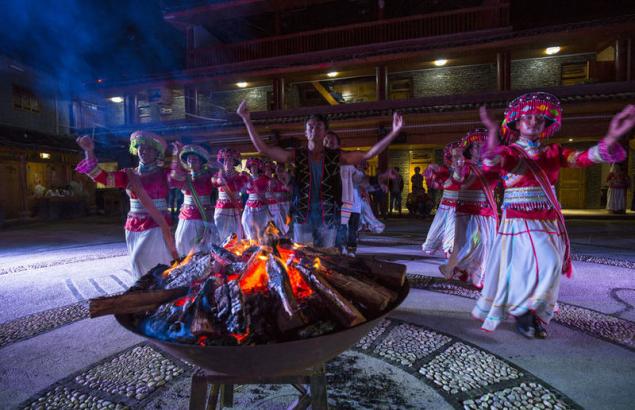
In the new Old town of Lijiang, which was built in order to numerous tourists here wasn't too crowded, buzzing with a fun, carefree life. Restaurants everywhere selling Souvenirs, live music. Unlike other popular tourist destinations, there is no audible foreign speech, and souvenir sellers lost when they English ask price. It seems that 99.9% of tourists in Lijiang — Chinese. Foreign tourists we met here once — it was a group of tourists from South Korea.
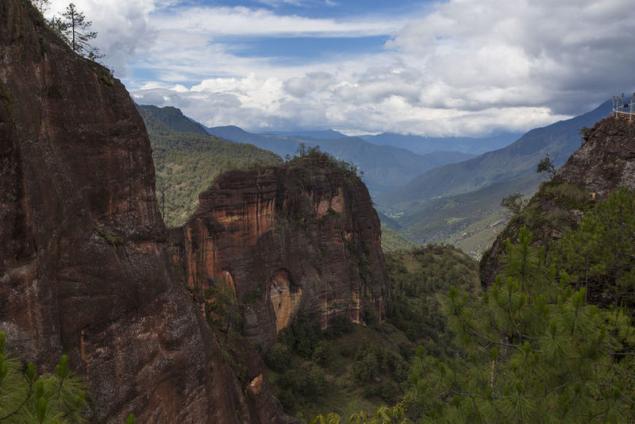
China in terms of tourism is self-sufficient. There are many countries where the increase or decrease in the number of foreign tourists could significantly affect the economy. But 1.4 billion China is highly developed domestic tourism, and those coming here from abroad, do not make the weather. Thus, the focus everywhere is on compatriots.
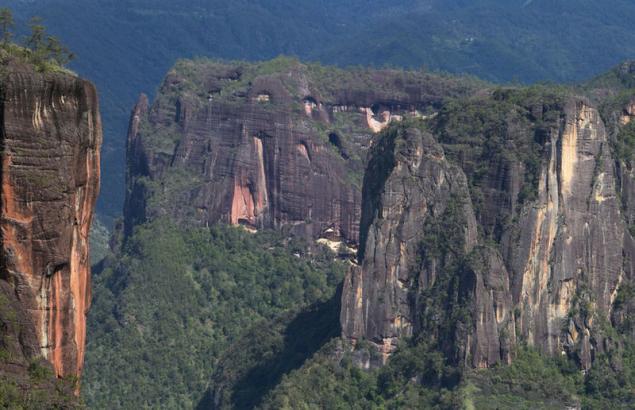
For example, traveling on the outskirts of Lijiang, we drove to a huge luxurious Buddhist temple. I began to look for information in English, but I never found the words in Latin. The name of the monastery — Zhi Yun (Yun Zhi) — was able to learn only from the guide. At the entrance to the monastery I drew the attention of two local girls. They asked to be photographed with them, and then one of them, cheerfully laughing, has posted a photo taken in a mobile application is kind of blocked in China, Instagram. "Look, what a miracle wandered into our territory" —one can only assume that meant the characters in the caption to the photo.
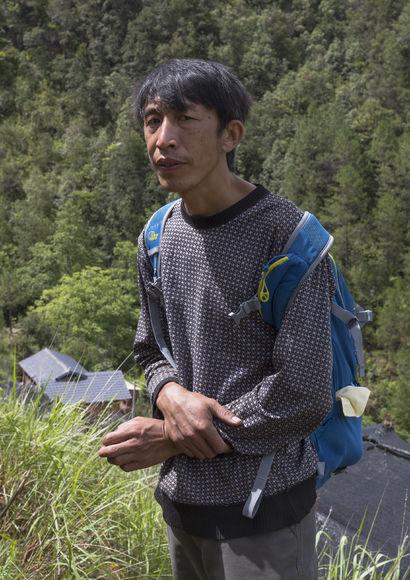
Three days we spent in the village of liming, which went to visit the local national Park Lisonglang and the nearby villages participating in the project Clarins. And every day I find confirmation of the view that China is a country of contrasts. For example, during a walk through the national Park we were impressed by the "Wi-Fi from God": usually in these natural areas not running even the ordinary mobile phones, but here almost every route point to the fact Wi-Fi. In the villages remained quite Patriarchal, although in technical terms here is significant amount of progress — there was electricity, was built the highway, there was school.
Someone from the audience asked the head of the community of farmers of the village of Liguan why he doesn't want to move to the city like many others. The answer was simple: "Here I have to myself all day, and the city will be my only time for food and sleep".
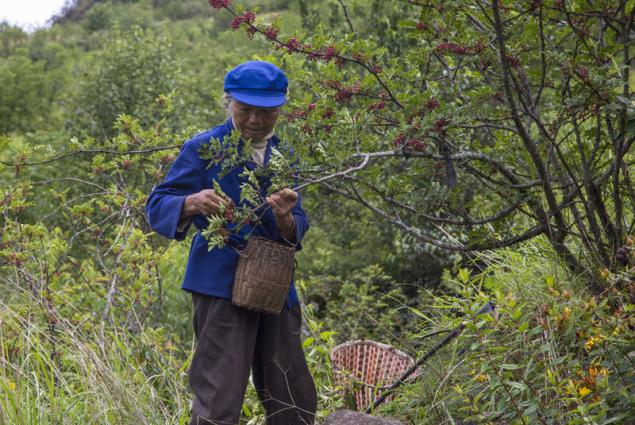
Remember the story of Mr. Lee, a farmer from the village of Mala. In his youth, he left his village to receive a secondary education (in his village had only primary school). Then became a primary school teacher in the same school where I studied. But when the school began to come to teachers with higher education, Mr. Li began to doubt the correctness of the chosen profession. He decided to leave school and went to the city in search of a new profession. Lee tried his hand at various jobs, but it was not the fact. He recalls "the worst job in his life" when he had to perform extremely difficult physical work for it and earn about 20 yuan a day (about 200 rubles). To support his wife and two children and it was problematic. Then he decided to return to his village and become a farmer. By this, it was found that not just the case for everyone, but a new vocation. Returning home, he noticed that in and around the village no longer meet the Yunnan Torrey (Torreya fargesii var. yunnanensis) is a coniferous tree of the yew family, native to Central and southern China.

Were all grown here of Torrey was carved a visiting businessman: their wood was a valuable material. Others suffered at the hands of the farmers themselves — it was the easiest way to earn good money. Then Mr. Lee set out to restore the population of this tree, but could not germinate the seeds. Finally, he was lucky: five years ago, he ascended the first of Torrey. But recently about efforts of Mr. Lee learned representatives of Clarins, and decided to support his initiative. Now Mr. Lee is an integer field reserved for seedlings Torrey. The profits from this project will be able to the grandchildren only If: Torrey grow slowly, will begin to bear fruit only after half a century, and to use their wood can only be through the century. But Mr. Lee is not confused, he thinks big — for centuries. In addition, about 40% of the seedlings he intends to plant in the forest, to help restore this endangered tree species.
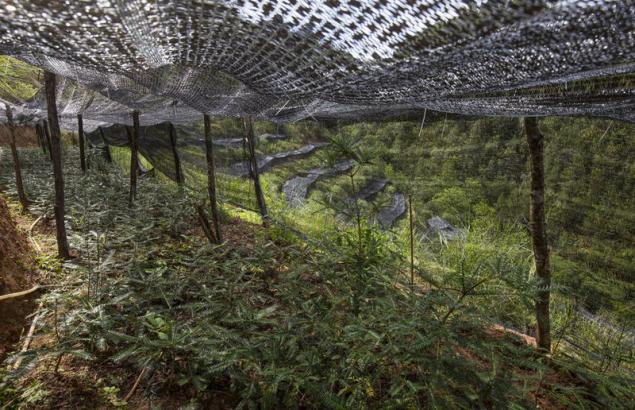
Acquaintance with Mr. Lee in some sense opened our eyes. It became clear that local farmers can, among other things, to help nature, and village life was not so bleak as it was in the old days. Was told that some farmers nation Fox in years gone whiled away their days in an atmosphere of laziness, drunkenness, lack of money and lack of rights of women. Mr. Lee was impressed by the happy, energetic man with burning eyes.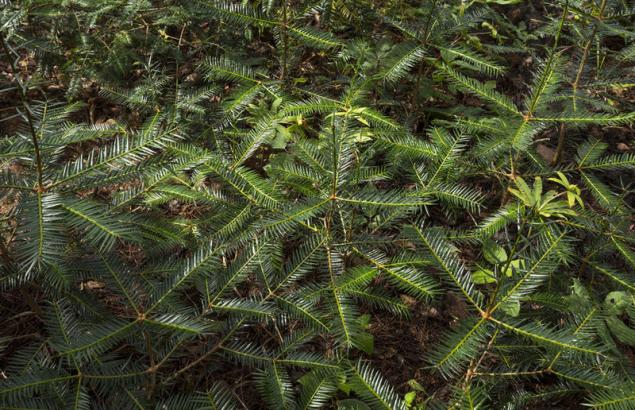
On the way back from China, we again plunged into the atmosphere of contrasts. On the way to Lijiang we saw solar panels generating electricity for a village, but in the same village ahead of the car with a smoky engine. Evening in the village café with ten delicious dinner for 160 yuan (about 1600 rubles), and the next day in a cafe in Lijiang airport was amazed at the price of a cappuccino 60 yuan (600 rubles). In the "tea" China coffee — a rarity, but still this price tag is surprising. In the village of liming, we met ordinary people, leading a modest life, and in Lijiang our minibus was parked next to a Rolls-Royce Phantom. On the way to Beijing from Lijiang, glancing round at the sitting next to us Chinese girls, I noticed each of them a white iPhone 6. Real. Not fake.
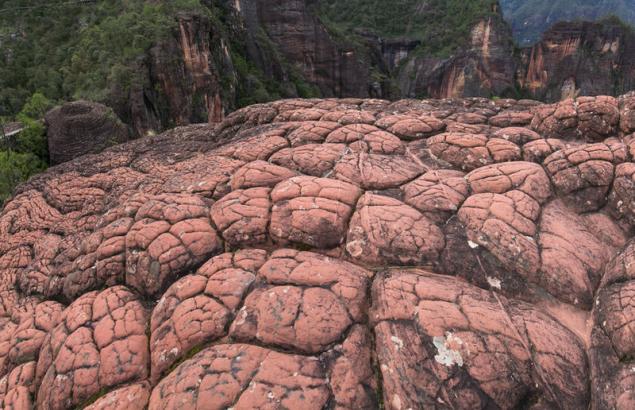
At the end of our trip in the magazine and on the website the article will be published on biodiversity from Yunnan and social project, implemented in the province with the participation of Clarins. In the meantime, watch the photos of the trip. published
P. S. And remember, only by changing their consumption — together we change the world! ©
Join us in Facebook and in Vkontakte, and we're Classmates
Source: www.nat-geo.ru/planet-clarins/530921-reportazh-iz-kitaya-istoriya-fermera-kotoryy-myslit-stoletiyami/

This place in Yunnan province is called the first turn of the Yangtze. To the North is the national Park "Three parallel rivers" in which the three major rivers of Asia — the Yangtze, Mekong and Salween — flow almost parallel from North to South. But here, in the town of Shiga, the Yangtze changes direction almost 180 degrees and begins to flow North while the Mekong and Salween continue to flow to the South and soon leave China. Changjiang — the longest river in Eurasia, — popetlyat in Yunnan, begins to flow to the East and connects the whole China. On the East of the country, near Shanghai, the Yangtze flows into the East China sea.Photo: Andrey Kamenev


A team of Russian National Geographic in conjunction with the Clarins representatives went to the Chinese province of Yunnan to shoot the project on the conservation of biodiversity. Read the new report and see the pictures.

If the Chinese Kunming, about which we talked earlier — "city for life", our next stop on the way — the ancient city of Lijiang — the "place".

In the new Old town of Lijiang, which was built in order to numerous tourists here wasn't too crowded, buzzing with a fun, carefree life. Restaurants everywhere selling Souvenirs, live music. Unlike other popular tourist destinations, there is no audible foreign speech, and souvenir sellers lost when they English ask price. It seems that 99.9% of tourists in Lijiang — Chinese. Foreign tourists we met here once — it was a group of tourists from South Korea.

China in terms of tourism is self-sufficient. There are many countries where the increase or decrease in the number of foreign tourists could significantly affect the economy. But 1.4 billion China is highly developed domestic tourism, and those coming here from abroad, do not make the weather. Thus, the focus everywhere is on compatriots.

For example, traveling on the outskirts of Lijiang, we drove to a huge luxurious Buddhist temple. I began to look for information in English, but I never found the words in Latin. The name of the monastery — Zhi Yun (Yun Zhi) — was able to learn only from the guide. At the entrance to the monastery I drew the attention of two local girls. They asked to be photographed with them, and then one of them, cheerfully laughing, has posted a photo taken in a mobile application is kind of blocked in China, Instagram. "Look, what a miracle wandered into our territory" —one can only assume that meant the characters in the caption to the photo.

Three days we spent in the village of liming, which went to visit the local national Park Lisonglang and the nearby villages participating in the project Clarins. And every day I find confirmation of the view that China is a country of contrasts. For example, during a walk through the national Park we were impressed by the "Wi-Fi from God": usually in these natural areas not running even the ordinary mobile phones, but here almost every route point to the fact Wi-Fi. In the villages remained quite Patriarchal, although in technical terms here is significant amount of progress — there was electricity, was built the highway, there was school.
Someone from the audience asked the head of the community of farmers of the village of Liguan why he doesn't want to move to the city like many others. The answer was simple: "Here I have to myself all day, and the city will be my only time for food and sleep".

Remember the story of Mr. Lee, a farmer from the village of Mala. In his youth, he left his village to receive a secondary education (in his village had only primary school). Then became a primary school teacher in the same school where I studied. But when the school began to come to teachers with higher education, Mr. Li began to doubt the correctness of the chosen profession. He decided to leave school and went to the city in search of a new profession. Lee tried his hand at various jobs, but it was not the fact. He recalls "the worst job in his life" when he had to perform extremely difficult physical work for it and earn about 20 yuan a day (about 200 rubles). To support his wife and two children and it was problematic. Then he decided to return to his village and become a farmer. By this, it was found that not just the case for everyone, but a new vocation. Returning home, he noticed that in and around the village no longer meet the Yunnan Torrey (Torreya fargesii var. yunnanensis) is a coniferous tree of the yew family, native to Central and southern China.

Were all grown here of Torrey was carved a visiting businessman: their wood was a valuable material. Others suffered at the hands of the farmers themselves — it was the easiest way to earn good money. Then Mr. Lee set out to restore the population of this tree, but could not germinate the seeds. Finally, he was lucky: five years ago, he ascended the first of Torrey. But recently about efforts of Mr. Lee learned representatives of Clarins, and decided to support his initiative. Now Mr. Lee is an integer field reserved for seedlings Torrey. The profits from this project will be able to the grandchildren only If: Torrey grow slowly, will begin to bear fruit only after half a century, and to use their wood can only be through the century. But Mr. Lee is not confused, he thinks big — for centuries. In addition, about 40% of the seedlings he intends to plant in the forest, to help restore this endangered tree species.

Acquaintance with Mr. Lee in some sense opened our eyes. It became clear that local farmers can, among other things, to help nature, and village life was not so bleak as it was in the old days. Was told that some farmers nation Fox in years gone whiled away their days in an atmosphere of laziness, drunkenness, lack of money and lack of rights of women. Mr. Lee was impressed by the happy, energetic man with burning eyes.

On the way back from China, we again plunged into the atmosphere of contrasts. On the way to Lijiang we saw solar panels generating electricity for a village, but in the same village ahead of the car with a smoky engine. Evening in the village café with ten delicious dinner for 160 yuan (about 1600 rubles), and the next day in a cafe in Lijiang airport was amazed at the price of a cappuccino 60 yuan (600 rubles). In the "tea" China coffee — a rarity, but still this price tag is surprising. In the village of liming, we met ordinary people, leading a modest life, and in Lijiang our minibus was parked next to a Rolls-Royce Phantom. On the way to Beijing from Lijiang, glancing round at the sitting next to us Chinese girls, I noticed each of them a white iPhone 6. Real. Not fake.

At the end of our trip in the magazine and on the website the article will be published on biodiversity from Yunnan and social project, implemented in the province with the participation of Clarins. In the meantime, watch the photos of the trip. published
P. S. And remember, only by changing their consumption — together we change the world! ©
Join us in Facebook and in Vkontakte, and we're Classmates
Source: www.nat-geo.ru/planet-clarins/530921-reportazh-iz-kitaya-istoriya-fermera-kotoryy-myslit-stoletiyami/





